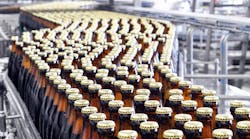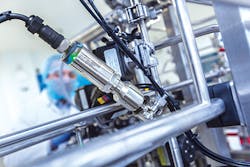Editor's Note: This post was sponsored by Endress+Hauser.
When you’re in charge of operations at a large brewery and realize that your team is spending too much time on instrument calibrations, using processes that are potentially hazardous, who do you call?
One major brewing facility in the United States recently faced this challenge. With close to 100 RTD thermometers installed at the plant, the manual calibration process had become time consuming, taking up nearly 80 hours of labor each year.
CHALLENGE:
Reduce the time required for manual calibration of nearly 100 RTD thermometers
SOLUTION:
Endress+Hauser iTHERM TrustSens, selfcalibrating thermometers deployed to replace portable micro-baths and other calibrators
BENEFIT:
Calibration time reduced substantially, improved safety and process efficiency
The brewery had been using a combination of portable micro-baths and other calibrators to perform calibrations on its RTD thermometers. The micro-bath calibrations involve the use of hot oil and an ITS-90 traceable reference thermometer. Each time the micro-bath was moved to a new location, the oil needed to be heated to the appropriate temperature and allowed to stabilize prior to performing the actual single point calibration.
Consequently, this process was taking the tech team around 45 minutes on average to calibrate each thermometer. Performing calibrations using the portable hot oil micro-baths also was creating safety concerns and challenges, as transporting a micro-bath containing hot oil from sensor to sensor had the potential to become a serious safety hazard if not done properly and carefully.
“Calibration is a very intimate process,” says Robert Jennings, calibration and repair manager at Endress+Hauser. “Technicians have to stop production, so there’s no money being made, and they also have to take instruments offline. There could be a lot of risk involved, not just with the device being calibrated, but then getting production back online successfully.”
The brewery’s lead instrumentation specialist was challenged to fix the situation. He was assigned to lead a project that would identify a safer and more efficient method of performing calibrations on its fleet of RTD thermometers.
“You can imagine the quantity of instrumentation needing to be calibrated,” adds Jennings. “You have to be able to work fast, efficiently and effectively. And then from there, you have to get back online.”
The project lead made a quick decision to purchase an Endress+Hauser’s iTHERM TrustSens hygienic thermometer, the world’s first self-calibrating thermometer, to see if it would save time and reduce risk and cost.
A self-calibrating solution
Endress+Hauser’s iTHERM TrustSens thermometer is designed to maximize product safety, plant availability and process efficiency. In particular, the TrustSens thermometer has a high-precision reference built into the temperature sensor which aides in the calibration process. Its automated and fully traceable inline self-calibrations reduce process downtime, helping to minimize risk and costs.
Nathan Hedrick, national product manager at Endress+Hauser, explains why automated calibration capabilities are critical in modern plants: “Assume you’ve got stable measurements that are unlikely to drift. When the schedule indicates that it is time to manually calibrate the instrument, you may be arbitrarily taking it out of calibration, inducing unnecessary cost and downtime, and increasing the risk of damage to a device that is working perfectly fine. Instruments that are self-calibrating in place enable you to achieve more frequent calibrations that are automatically triggered by pre-set deviations.”
Employing the TrustSens temperature transmitter with Heartbeat Technology, calibration results are captured after every successful self-calibration. When technicians need the calibration history, they can connect directly to the transmitter or through a HART connection from the control system. Utilizing TrustSens’ DTM the information is visible on the associated software or a printed calibration certificate can also be produced. The TrustSens thermometer eliminates the risk of undetected non-conformance issues without impacting existing validated procedures or GMP.
The TrustSens thermometer has a high precision reference built into the temperature sensor which aides in the calibration process.
Typically, TrustSens is employed as a method of in-situ calibration for processes that undergo sterilize-in-place (SIP) on a regular basis. As steam is introduced to the process, the temperature passes through the 118°C threshold that triggers the TrustSens calibration. However, the brewery did not employ SIP, instead using a simple portable ceramic block heater in conjunction with TrustSens unique technology to perform the single point calibration.
In this case, the brewery technicians remove the TrustSens temperature probe from the thermowell and place it in the ceramic block heater. Once the temperature at the RTD exceeds 118°C, TrustSens then begins to cool and automatically initiates the calibration cycle. If the RTD is within the brewery’s self-defined accuracy tolerance, a green light appears. The technician then reinstalls the probe into the thermowell and proceeds to the next RTD.
Significant time savings
The self-calibrating thermometer proved up to the task of delivering an efficient means for calibration while also improving worker safety. The brewery tested the TrustSens thermometer side-by-side with one of the facility’s original RTDs and was extremely pleased with the results. Using the ceramic block heater, the calibration of the Endress+Hauser iTHERM TrustSens sensor takes no longer than 15 minutes, saving 30 minutes per RTD.
Jennings adds that when performing calibrations, depending on the discipline, the technician may have to rescale the device to get the best resolution out of the outputs. “That’s also a risk, because not only are you pulling the device out of the production line, now you’re also reconfiguring the device.” In cases like this, Endress+Hauser service teams stand ready to support on-site calibrations as needed. “Part of the procedure in our documentation is that we save parameters and forward count. We reconfigure, if needed, to get the best resolution out of the device to see truly how it’s performing and then re-stand the device, if necessary.”
However, if the brewery replaces the RTDs that are currently in the facility with TrustSens, it will save close to 80 hours in calibration time annually, considering some transmitters are calibrated once a year and others every six months. Using TrustSens as the new calibration solution also greatly reduces the risk to the brewery’s technicians by eliminating the hot-oil microbaths that workers were carrying from location to location within the plant.
Jennings adds that the benefits of self-calibrating instruments extend into the realm of optimized inventory. “When the deviation gets to a certain point where it’s been adjusted time after time—having that data to know how far you’ve drifted is critical to planning for replacements.”

